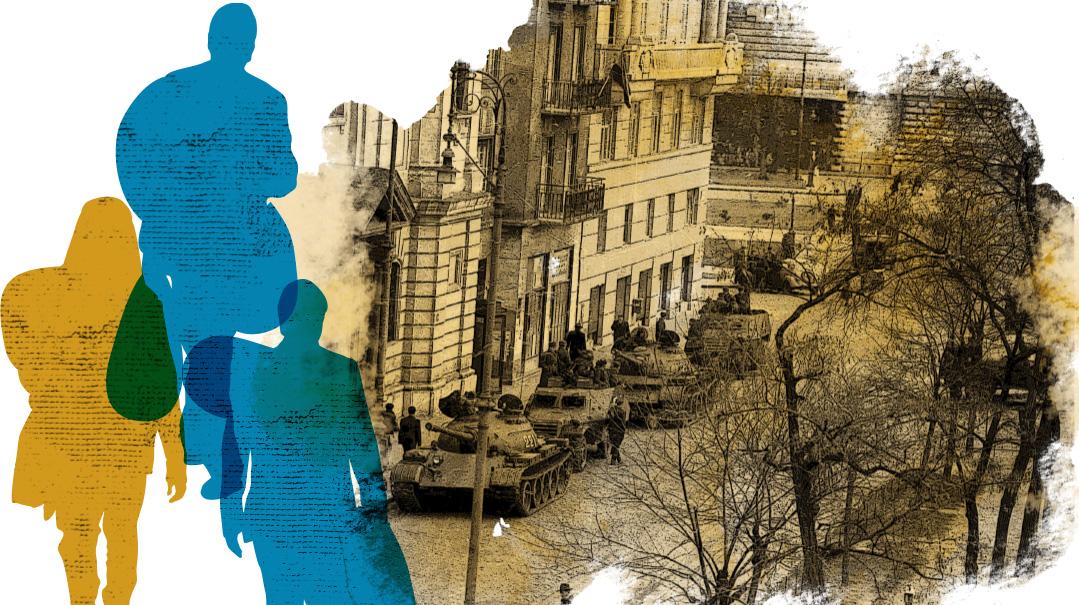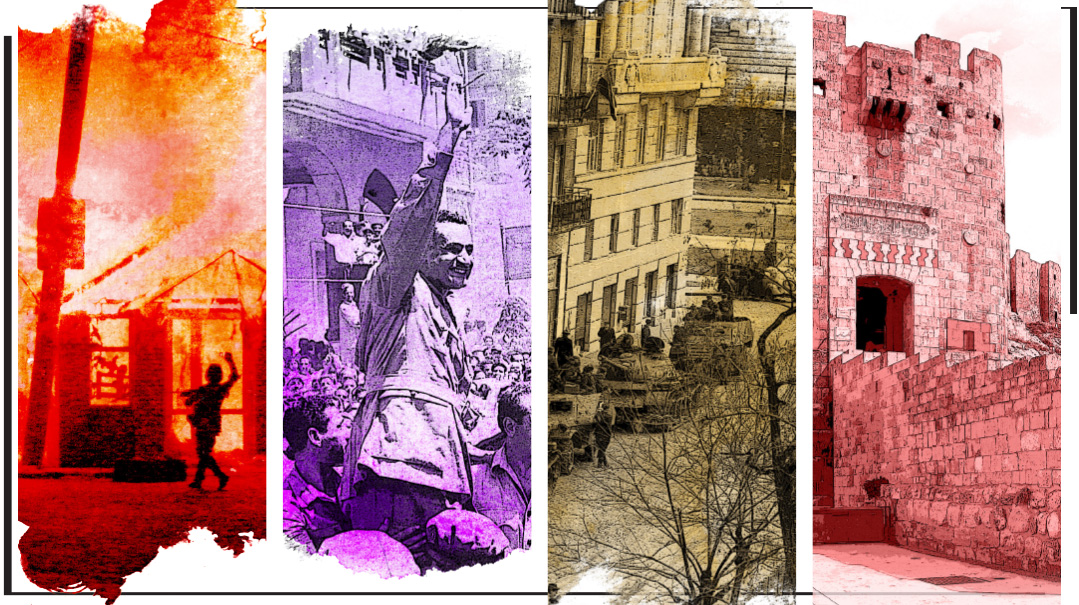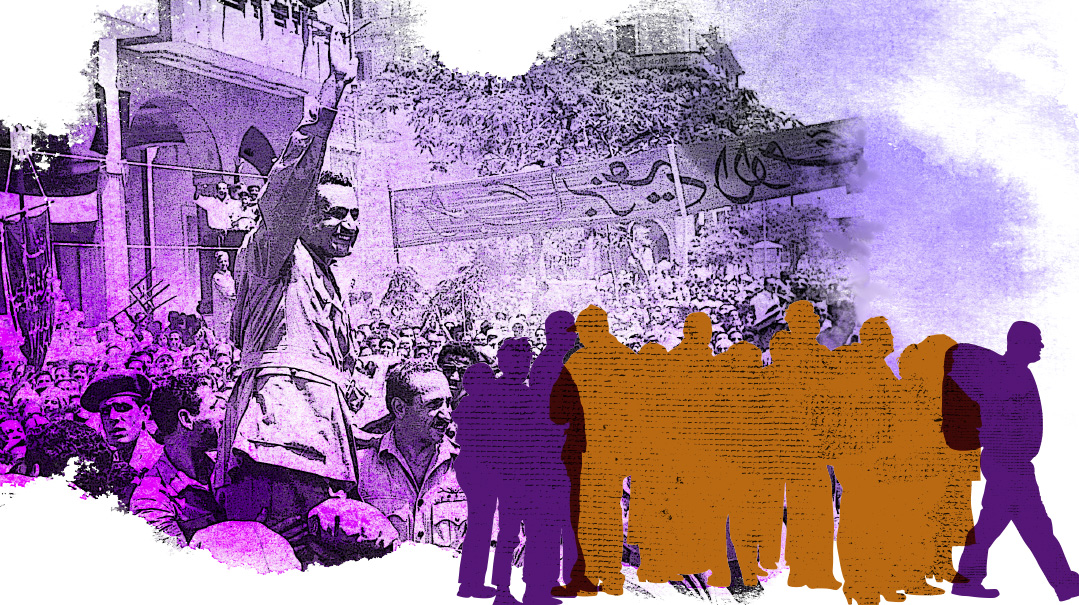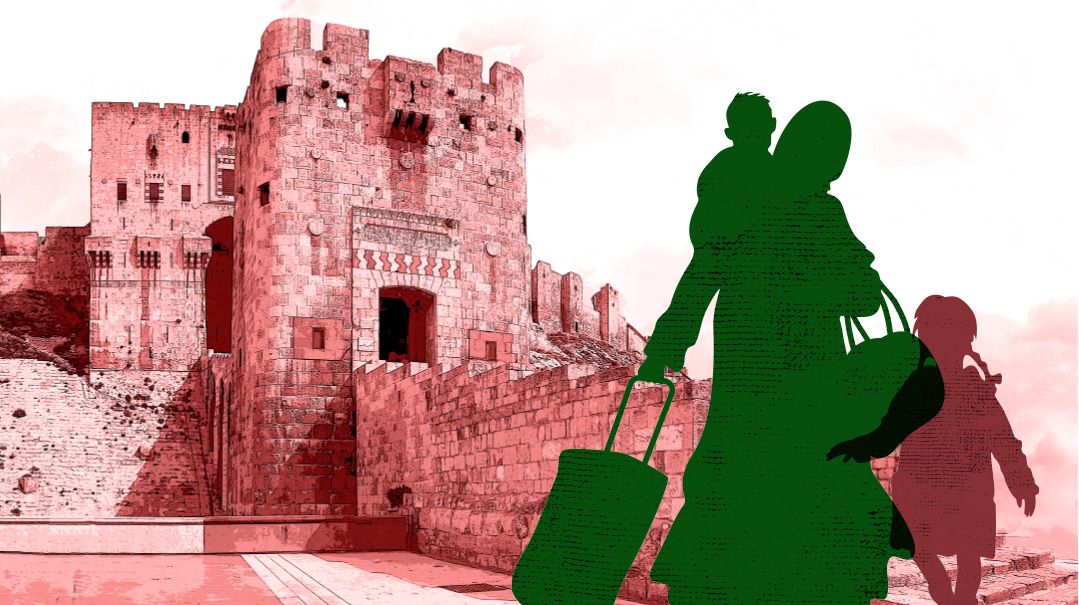Out of the Rubble

In this day and age, could war and destruction really upend our lives overnight?
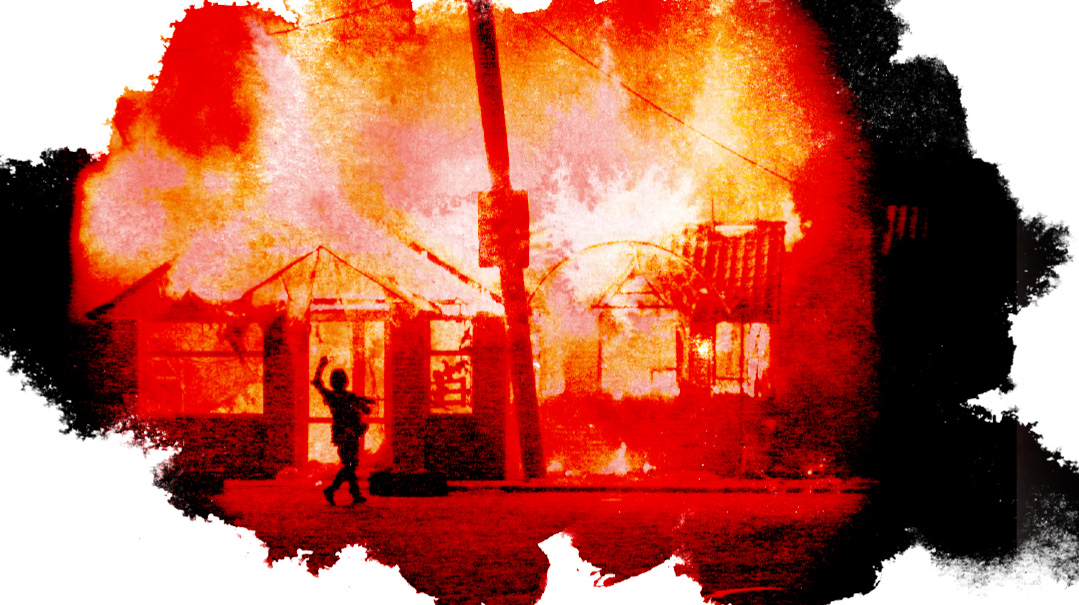
Photos: AP Images
As told to Rivka Streicher by Miriam Moskovitz
“W
ill there be school tomorrow?”
“Of course.”
There was talk of war, and we weren’t naïve, but we didn’t imagine it would actually happen — it just didn’t make sense in this day and age. When our daughter got married at the end of January in Kharkov, Ukraine, where we lived, the singer from Israel didn’t want to come “due to the impending war.”
“What war?” we countered. “We’re having 500 people at the wedding!”
So to the callers who were asking about school — the school we’d built with 40 children in 1990 that now had over 400 — we said, “Yes, yes.”
And then, just like that, it was, “No.”
By 5 a.m. on Thursday, February 24, there was no more denying. We were being bombed. There went school, there went normal life.
As Chabad shluchim, our focus is on spreading Yiddishkeit, but immediately it shifted to the basics: We had to make sure people had what to eat. Our cook moved into the shul and we set up a network of drivers who braved the streets to deliver food. We also started helping people who wanted to flee to Europe and Israel.
Chabad of Kharkov became a port in the storm. People whose houses had been bombed moved into the shul. They came with their children, their cats and dogs. The shul was like Noah’s Ark, 100 people sleeping in the basement.
By Friday night, there were no more streetlights. The city was pitch black so bombers couldn’t target it. Despite the fear and the dark, over 150 people showed up in shul for davening.
My 14-year-old son was davening Kabbalas Shabbos and his young voice rang out amid a backdrop of boom, boom, boom. A few miles away, Russian tanks were trying to enter Kharkov, and here we were, celebrating a surreal Shabbos with singing and good food.
By Sunday morning, no one was allowed to leave their homes — Russian tanks were in the city, and they were shooting. By late afternoon, the Ukrainians had managed to destroy much of the tank force and get the Russians out. We thought it was over, that Kharkov was safe, but the next day, the Russians began aerial bombing.
We saw Chaim, a member of my husband Moshe’s nightly learning group, pass our house. Moshe asked him why he was out in the deserted streets.
“I’m going to volunteer for the army,” Chaim said, gesturing toward the recruitment center two doors from our house. Moshe called Chaim in, gave him tefillin, and blessed him with safety.
Chaim was told to report to the main square at 8 a.m. the following day, but he decided to daven Shacharis in shul before he left. At 8 a.m., there was a tremendous boom: The main government building had taken a direct hit. Had he not been at shul, Chaim would have been right there.
The basement of our house became our family’s shelter, with sandbags in the window. My son, daughter-in-law, their four little kids, and four of our own hunkered downstairs. Meanwhile, Moshe and I went to the shul to make sure everyone had food and essentials.
But when the situation worsened, with the Russians bombing not just military targets but random buildings, including one two doors away from our home, we realized we had to send the children away to safety, begin an evacuation, and arrange for a convoy out of our embattled city.
Our initial plan was to evacuate the children — we told the kids they could take one shopping bag of personal possessions. My husband and I were going to stay with the community. We were the captains of the ship — how could we leave?
But my children refused to leave without us, and the refugees on our convoy — including hundreds of children from an orphanage — needed us as well. I realized that we’d have to go too.
I started packing. We’d been in Kharkov for 32 years but could take only three suitcases. I left so much behind — all our silver, including my Shabbos candles and our menorah — hoping we’d be back.
At 6 a.m. the next morning, we went to the shul. Moshe went to the paroches, closed his eyes, and prayed.
We went down to the basement, where dozens of people were sleeping, and said goodbye. When I took leave of my devoted cook of many years, she was crying, I was crying. We were leaving our shlichus, our mission, our beautiful shul with hundreds of members, which, when we had arrived in 1990, had been a sports complex.
Back home, we tried calling the driver, but he couldn’t come because of the shooting. Our van finally pulled up an hour and a half later.
Since the war began, we’d been only around 400 meters from our house to the shul, a distance of five minutes. We were now driving through the streets of Kharkov, witnessing up close the horrific destruction: houses shelled, supermarkets blown up, broken glass everywhere.
What will be? I thought. When will we be able to return?
Moshe reminded us of a story of the well-known chassid Rav Mendel Futerfas, who was exiled to Siberia. He asked a tightrope walker he met there, “What’s the hardest part of tightrope walking — is it when you jump, when you run?”
The man answered, “The hardest part is when you turn around — when you lose the focus of your direction.”
I got it — that was us.
“Now we have a new focus,” Moshe continued. “To keep caring for Kharkov from afar, to help the refugees in Kharkov, across Europe, in Israel.”
With that in mind, we drove on to Dnieper. The difference was stark: Stores were open, people were going about their business, but many were fleeing from there as well.
“We saw what happened in your city — we’re afraid it will happen here,” they said.
Two buses were leaving Dnieper with a police escort, so we followed them, once we found a driver willing to do the 24-hour-plus journey. It was congested, sometimes completely jammed, as everyone was fleeing westward. At times, the only way to pass was to drive on the wrong side of the road. Our phones rang constantly with people desperate for food, medicines, and information about their families in Kharkov.
We ran out of food and our phones ran out of charge, but the real concern was gas. At about 11 p.m., our driver turned around.
“Ten minutes’ worth of gas left,” he said.
We said Tehillim, and then found a gas station. Finally, we arrived in Moldova at sunrise. We huddled in the cold, some of us in boots and coats while others were in only sneakers and sweaters. Exhausted and overwhelmed, we waited for another bus to take us to Kishinev, the capitol of Moldova, a three-hour trip.
In Kishinev, they distributed boxes of essentials to the refugees. I remember thinking, No, that’s not us. But that night, we slept on mattresses on the floor, like the refugees we were.
We stayed in Kishinev for Shabbos. After Kiddush Friday night, Moshe started dancing and singing with some of the other men.
“Are you guys crazy? What on earth are you dancing about?” a journalist who was there asked.
Moshe answered with the story of a child who wants a candy from his father, but the father doesn’t want to give it to him. The child starts making a brachah, and the father has to give in.
“If we sing and dance now,” Moshe explained, “G-d will have to give us a reason to celebrate.”
From Kishinev, we made our way to Romania, where there were special flights to Israel. We were accompanied by media along the way, and everyone was happy we were safe, but we were distraught. The news out of Kharkov was frightening: Our school was bombed, there was a direct hit on our yeshivah, the windows of our shul had been shattered. Would there be anything to return to?
We made it to Israel a few days before Purim. Purim in Kharkov is always a huge deal, but this year, we did our best to man efforts remotely. I arranged a Zoom meeting for the women in my learning group, and those still in Kharkov came on in the dark. I dredged up words of chizuk, connecting with my women wherever they were. At a Purim party we organized for Ukrainian refugees, there was a lot of crying. But there was hugging and laughter too; these people who had lost everything were determined to find solidarity with one another and try for joy again.
There was a lot of work to be done in Israel, and we got busy coordinating humanitarian efforts to ensure hot meals, food packages, and medicines for those in need in Kharkov, and to evacuate to safety those able to leave.
Just before Shavuos, there was a lull in the fighting, and my husband was able to go to Kharkov with our son and daughter, where they’ve remained despite the bombings. In the shul, Moshe tearfully kissed the paroches, and then he went around to see community members in their homes.
One person he visited was 90-year-old Isaac, who didn’t know how to daven but would come to shul every Shabbos and enthusiastically sing two songs he’d learned. Between Covid and the war, Isaac hadn’t left his house for two years. When Moshe showed up at his doorstep, Isaac fell into his arms, the two of them singing “his” songs.
We’re not in exile in the classic sense — after all, we’re well-taken care of in Eretz Yisrael — but overnight, we and thousands of others had to bundle our entire lives into a few suitcases and flee.
Three decades ago, we built a miracle, and we’re still waiting for the One Miracle that will bring us all back Home.
Rav Moshe and Rebbetzin Miriam Moskovitz have served as co-directors of Chabad of Kharkov, Ukraine’s second-largest city, since they were sent by the Lubavitcher Rebbe as a young couple in 1990, when the Ukraine was still part of the Soviet Union.
(Originally featured in Mishpacha, Issue 922)
Oops! We could not locate your form.

